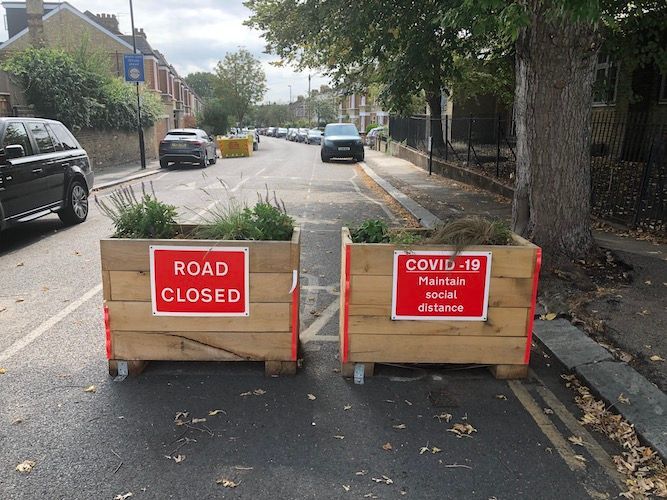Transport secretary Grant Shapps has told councils to conduct opinion surveys to cut through the “noise” generated by debates over the implementation of local active travel schemes, such as segregated cycle lanes and low traffic neighbourhood residential street closures.
Many councils have experienced conflicts in pursuing these local traffic schemes delivered with emergency funding provided by the government to reallocate roadspace during the Covid-19 restrictions. Some schemes have had to be removed as a result.
In his letter to council leaders announcing their next allocations from the £175m Emergency Active Travel Fund, Shapps says “objective tests of public opinion, such as scientific polling” can “cut through the noise and passion schemes generate and gather a truly representative picture of local views”.
“There is clear evidence that for all the controversy they can sometimes cause, ambitious cycling and walking schemes have significant, if quieter, majority support,” he acknowledges
Manchester community scheme leads to acrimony
Amongst authorities who have had difficult situations to deal with are Manchester City Council who are now reviewing feedback to a consultation on a low traffic neighbourhood (LTN) scheme in south Manchester, that the council have had to take back control after the original plans provoked acrimony between residents.
The £2.5m Levenshulme and Burnage Active Neighbourhood project focuses on a network of residential terraced streets either side of the A6. Greater Manchester mayor Andy Burnham has pledged £2.4m to the project from his walking and cycling challenge fund and Manchester City Council is providing the remaining £100,000.
The project began as a community-led initiative but the council has since taken control after the community relations deteriorated.
Local group the Levenshulme Bee Network had led the funding bid for the project. It featured an open brief with the intention being that the local community would then lead the project design. As well as road closures, it was expected to feature ‘school street’ timed traffic restrictions, play streets, cycle parking, and landscaped parking spaces, initially temporary and followed by permanent works.
The project won the ‘Community project of the year’ at the Healthy Streets Summit last year. Chris Boardman, Greater Manchester’s commissioner for cycling and walking, said the project was “an excellent example of what happens when residents lead the way and are given the opportunity to design their neighbourhood in a way that best serves their needs”.
Residents subsequently fell-out over the outline designs. The Levenshulme Bee Network said its members had come in “for a lot of abuse, some of it personal, some of it libellous, often defamatory”.
Manchester City Council ended the Levenshulme Bee Network’s involvement in the project this summer.
Fiona Worrall, Manchester’s strategic director of neighbourhoods, told councillors last week: “We took the opportunity to strengthen the governance arrangements, revise the designs and refresh our approach to engaging with residents and businesses.”
Ealing residents challenge Council
Opponents of low traffic neighbourhood residential street closures in the London Borough of Ealing have been granted the right to bring a judicial review challenge against the council.
The case is being brought by Ealing Residents Against Low Traffic Neighbourhoods.
Mr Justice Holgate, the planning liaison judge, recently ruled that the group’s five claims against the council would be heard at a single hearing on a date yet to be agreed.
Ealing has implemented LTNs across the borough using experimental traffic regulation orders that do not require prior consultation.
Croydon residents seek judicial review
Meanwhile, in south London, the Open Our Roads campaign group has applied for a judicial review of the London Borough of Croydon’s LTN scheme in the Crystal Palace and South Norwood area.
The London Borough of Bromley is listed as an interested party in the group’s application. Bromley has criticised Croydon’s LTN, saying it has shifted traffic into its area.
Local businesswoman Eliska Finlay, who is the applicant for the judicial review, told local media: “We believe Croydon Council acted unlawfully with the decision to close our roads in Crystal Palace, Upper Norwood and South Norwood. Amongst other failings, Croydon did not undertake the necessary impact assessments, nor did they consult key stakeholder groups such as residents, businesses and people with protected characteristics before implementing the LTN.”
Croydon last week launched its own consultation on the future of the LTN scheme. Participants are being asked for views on whether it should remain as is, be removed altogether, or be ‘replaced’. The ‘replace’ option would see the planters that have been used to close roads to vehicles replaced with automatic numberplate recognition (ANPR) cameras.
Camera enforcement would allow emergency service vehicles to pass through all junctions. It would also allow eligible residents with permits to drive through the junctions.
Wandsworth sees boost to street trade
Elsewhere in London, Wandsworth Council has hailed the impact of weekend closures of high streets to vehicular traffic, saying the actions boosted trade in the cafes, restaurants and bars.
Wandsworth introduced temporary pedestrianisation schemes this summer on three high streets – Old York Road, Northcote Road, and Bedford Hill. The schemes on Old York Road and Northcote Road were extended until late October because of their popularity. Wandsworth says the closure of Bedford Hill was also popular with many people but was not extended because of issues about diverting bus routes.
Reflecting on the pilots, Paul Chadwick, Wandsworth’s director of environment and community services, told councillors: “The boldness of the decision to enact the closures and the resources in terms of funding and staffing to accompany them were very much a response to the drastic situation that many businesses faced in some of the borough’s most renowned food and drink destinations [because of Covid-19].
“The officers’ view is that expectations have been exceeded in this regard with clear business and employment benefits, with some businesses stating that the initiative had essentially saved them from going under.
“On average, trade with the road closures in place is 30 per cent up on year-on-year comparisons for July and August. Businesses estimate that, without the closure in place, trading would be 33 per cent down on year-on-year.
“They have certainly provoked debate and discussion regarding use of road space in our town centres and how this might be rebalanced towards pedestrians.
“The positive views of businesses represent an interesting change from traditional fears that loss of parking and road access would impact negatively upon trading, although it should be noted that some retail businesses still hold this view.”
Chadwick said a survey of Northcote Road in August found that 66 hospitality businesses (such as cafes and restaurants) supported the closures and wanted them extended, 15 businesses had un-furloughed a total of 48 members of staff, and 17 businesses employed a total of 42 new members of staff.
“A poll of visitors revealed that many were visiting specifically because they had heard about the closure – in other words they were new customers or they were visiting with a friend who lives locally who invited them along to visit the closed road.”
Northcote Road already has an annual festive closure and Chadwick said: “It would make sense for more permanent barriers and bollards to be installed so that it can support the local community in events and possibly alfresco dining during the summer months.”
The council plans to conduct a “detailed survey of the road to establish how a closure can be implemented quickly and securely to manage vehicle-borne threats”.
Newcastle lays £4 million plans
Newcastle City Council plans to trial low traffic neighbourhood (LTN) residential street closures to vehicles across the city.
The council has £4m to implement the programme of closures to reduce through traffic. Schemes will be delivered using experimental traffic regulation orders. These do not require consultation before being implemented. The consultation forms the first six months of the scheme.
Arlene Ainsley, Newcastle’s cabinet member for transport and air quality, said: “While we recognise that some people may make up their minds in advance of changes, this approach enables people to experience the realities of the changes and suggest any modifications of mitigations.”
She said LTNs could deliver safer conditions for walking and cycling “more quickly than major civil engineering works”.
“One thing we will have to tackle is the long-held view that shopping areas rely on passing trade by cars,” said Ainsley. “Some specific shops may, but the reality is that it’s not motor vehicles who spend money in local shops, it’s people.
“People tend to go where they feel comfortable, we want to make sure that they feel comfortable in their own local neighbourhoods and local shopping centres, without the fear of road safety issues from the dominance of motor vehicles.”
Edinburgh amends legal process
The City of Edinburgh Council is to change the legal mechanism for introducing the city’s first low traffic neighbourhood (LTN) scheme of residential road closures after opponents said the original plan was unlawful.
The council had proposed introducing the East Craigs LTN, in the northwest of the city, using a temporary traffic regulation order (TTRO). TTROs do not require public consultation before implementation. Edinburgh justified the urgency on grounds of Covid-19.
Opponents of the LTN received a legal opinion from an advocate (equivalent of a barrister in England) that road closures went beyond what could reasonably be introduced using a TTRO on Covid grounds. The council obtained its own legal advice that is understood to have echoed these concerns.
At a transport and environment committee meeting at the end of October, councillors voted 7:4 in favour of implementing the LTN using an experimental traffic regulation order (ETRO). The decision was referred to the full council by the Conservatives who oppose the scheme.
An ETRO will allow the council to implement the measures without prior consultation, the first six months of the scheme acting as the consultation period. The council says its intention is for the scheme to be made permanent if deemed a success.
Councillors also endorsed a limited set of measures to be implemented using a TTRO, including more space for pedestrians outside a school and a segregated cycle lane.


